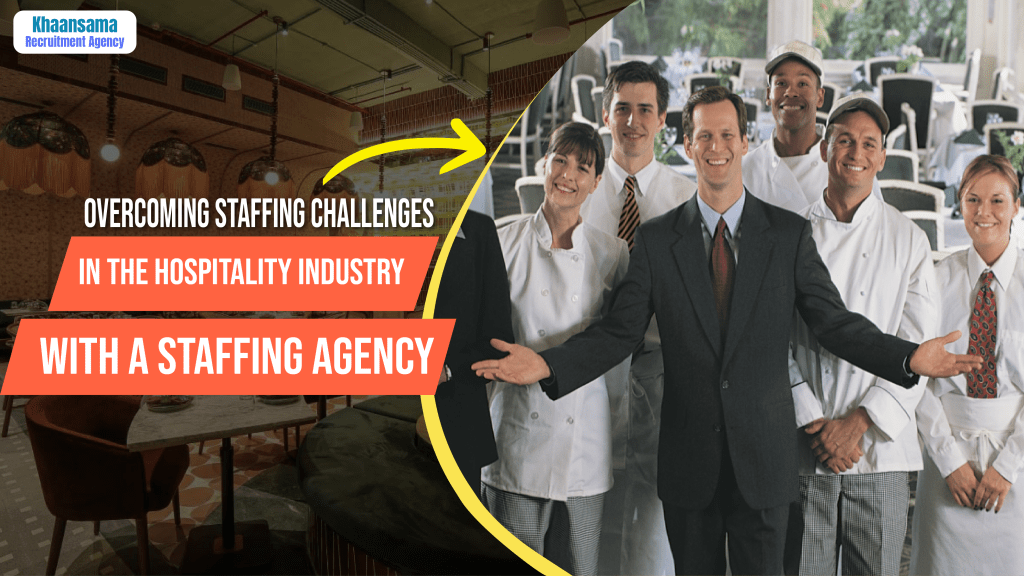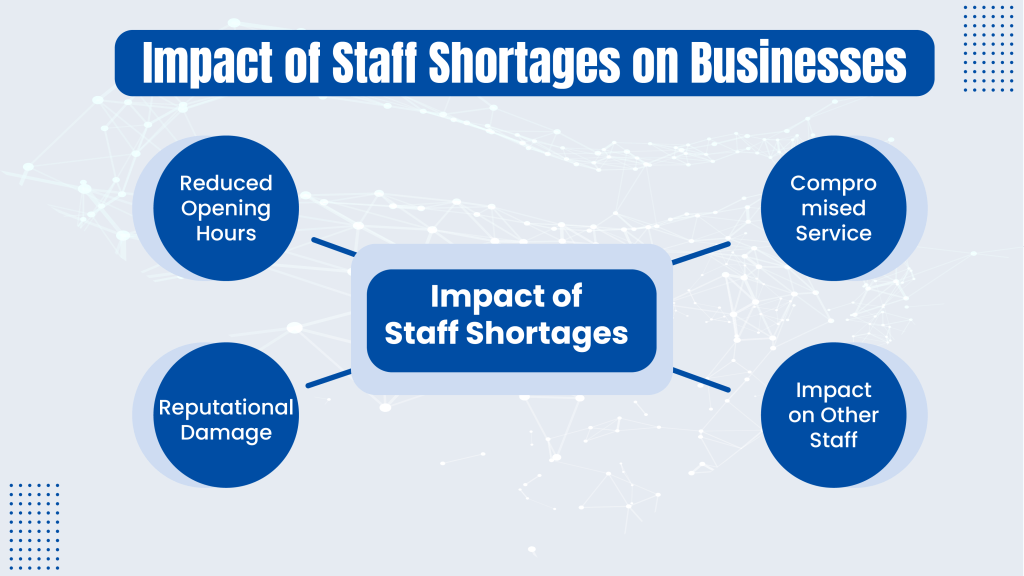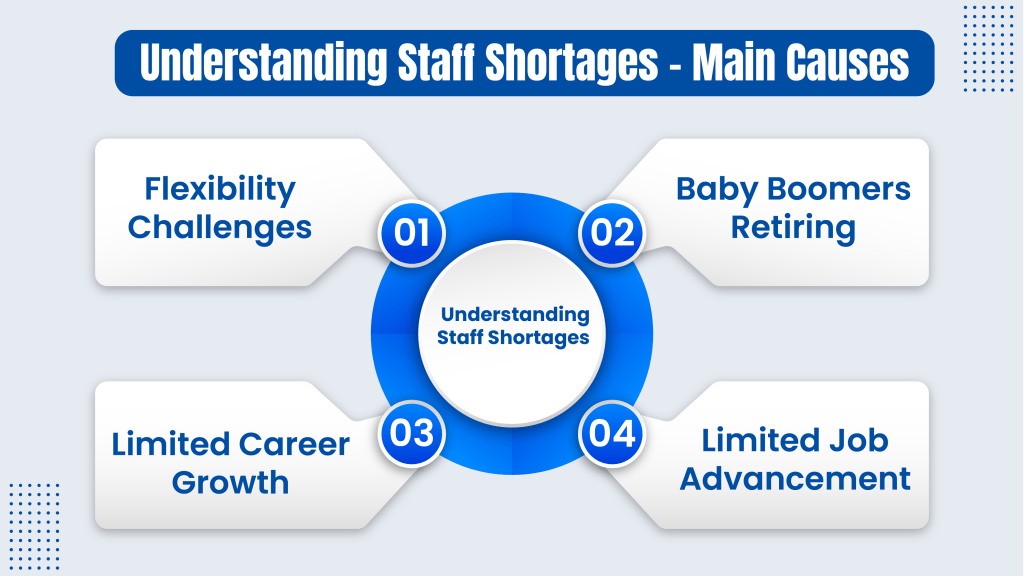
Overcoming Staffing Challenges in the Hospitality Industry with a Staffing Agency
There are signs of hiring everywhere you turn across the hospitality industry, from hotels to restaurants, cafes, pubs, and cloud kitchens. Hiring has become a challenge because finding the ideal talent and keeping them with you is hard. It is also hitting the business side of these establishments, prompting them to either meet demand or deliver the best delivery services. Most popular companies worldwide are hiring professional staffing agencies to compete with this fluctuating labor market.
Using a Hospitality Staffing Agency not only during labor shortages but also offers numerous benefits for businesses seeking workers and individuals looking for employment – whether it’s a permanent solution or part-time assistance. This article explores how staffing agencies can help you tackle staffing challenges.
The Hospitality Industry's Staff Shortage – A Big Problem Since Covid!
The hotel industry faces a significant issue with a shortage of skilled workers, a problem that has intensified since the onset of the Corona pandemic. Due to uncertainty, many employees have shifted to different industries, finding comfort in regular working hours without weekend and shift work, and are hesitant to revert.
Even before the pandemic, hospitality recruitment for the hotel industry was challenging. The reasons behind this difficulty are rooted in technological and social changes. Digitalization and new technologies have opened up various career paths, giving the younger generation more growth opportunities. Consequently, many young individuals opt to study or seek work in innovative, technology-oriented environments rather than entering the traditional hospitality industry. In 2019, there were 85,000 hospitality vacancies; by the end of 2022, this number had surged to 146,000, a 72% increase.
Impact of Staff Shortages on Businesses

The staffing shortages affect hospitality businesses in various ways:
● Reduced Opening Hours: Due to the reduced working staff, many businesses are reducing their operating time, and hotels bear more losses.
● Compromised Service: However, with the pent-up demand after lockdowns comes restrictions due to staff shortages in business establishments. The stressed teams will often lead to poor customer service.
● Reputational Damage: However, poor customer service can induce a rise in onsite and online complaints, thereby affecting the reputation of these business organizations. Others cut down on their opening hours to prevent negative ratings.
● Impact on Other Staff: Staff shortage creates more pressure on employees, forced to fill several other vacant positions. This scenario may result in increased working hours, extra stress due to the probation of new staff members, and difficulties with customer requirements. This can lead to a negative perception of working conditions, making staff retention more problematic.
Staffing Agencies – Your Savior in Tough Times
A staffing agency can come to your establishment’s rescue in many ways by providing the right team of employees. Here are some of the most important ways:
Access to Skilled Hospitality Workers
You can access top-notch permanent hospitality workers whenever you need them. Hospitality businesses often experience peak periods during tourist seasons, community events, or major occasions. A chef recruitment agency offers seamless handling of last-minute staffing requests with expert customer service. They have a pool of local workers with the necessary certifications and integrity testing in crucial areas such as housekeeping, banquet service, and culinary arts.
Moreover, the agency adopts a tech-savvy approach, allowing immediate connection with available workers for your impromptu shifts or short-term positions. No waiting period is required. This direct link to job seekers becomes invaluable when you need to fill a role on your team, whether for a single day or an extended period.
Select the Ideal Personalities for Your Hospitality Staffing
When hiring staff, one must know food service rules, appropriate table service, and sanitation practices. But skills and experience are only a part of ensuring successful recruitment. The quality of the entire customer experience is determined by team members with the proper personality. They should have good listening skills, top-quality communication, and the ability to enjoy meeting customer expectations.
A hospitality staffing agency can simplify and expedite the vetting process. Their staffing experts conduct interviews to understand candidates and assess how well they might integrate into your culture. These experts know the skills required for success, such as meeting high grooming standards and representing your business effectively. Plus, a Hospitality Staffing Agency like Khaansama selects well-trained, professional employees who can handle high-pressure jobs amid long working hours. With their assistance, you can be confident that your workers have the necessary skills and attitude for success.
Temporary Staffing for Event Support:
When your hotel gets ready for a major event with time constraints, and the chefs and waiters are already at their full potential, surprise obstacles may manifest. Someone may have to leave the team while another grabs an opportunity elsewhere. When this happens, your facility can resort to staffing agencies for temp hires, which help fill in gaps with skill and expertise. This ensures the project is completed while maintaining your permanent staff’s health.
Temporary staffing through recruitment agencies offers several advantages for organizations with seasonal needs, special projects, or unexpected personnel shortfalls. These benefits include specialist ability, flexibility, overhead cost, and employee well-being. Although there are also related costs, the benefits usually surpass these expenses.
Reduced Risk with Staffing Firms
The roles of an employer include carrying financial responsibilities like taxes, health insurance, and labor laws. Employing individuals exposes one to financial and operation risks, mostly when terminations or unforeseeable departures occur. When you hire a staffing company, they take most of these liabilities upon themselves.
Temporary associates are usually regarded as being employed by staffing firms. This implies that, in most cases, the responsibility for staff is fully on a business process outsourcing firm’s shoulders, relieving clients from such burdens.
Cost Savings
Engaging a Hospitality Staffing Agency like Khaansama can be a cost-effective and time-saving solution for your business. They become your ally in the hiring and management process by partnering with them. Khaansama handles the recruitment and vetting procedures, delivering the best candidates tailored to your needs. They also manage employee processes, including background checks, payroll, and liabilities. Simplifying the employee management further, these agencies assign a dedicated supervisor to each client, acting as the direct point of contact.
All these services come at a nominal cost, significantly saving your company thousands of dollars compared to handling recruiting in-house. On average, customers can anticipate an annual cost reduction upwards of atleast 10%. The all-inclusive pricing covers recruiting and hiring, employee benefits, taxes, workers’ compensation, and payroll.
Understanding Staff Shortages – Main Causes
Recognizing the value and scarcity of skilled hospitality workers is crucial in addressing ongoing staff shortages. Historically, these employees were often seen as replaceable, leading to insufficient focus on retention efforts.
In today’s job market, exceptional hospitality workers are a precious resource. Employers must prioritize retaining their current talent, not only to tackle the current staffing crisis but also to guard against future shortages.
● Flexibility Challenges
The hospitality industry’s continuous operation leaves little room for flexible work schedules. The industry’s reliance on late-night and early-morning operations makes attracting and retaining employees seeking a better work-life balance challenging.
And it also has been said by experts that most staff shortages result from the unsociable hours associated with the hospitality sector, which is understandable. Acknowledging this concern and exploring innovative solutions for more flexible work arrangements can help alleviate the staffing crisis.
● Baby Boomers Retiring
When baby boomers from the hotel staff retire, a limitation in finding replacements and difficulties for hospitality businesses to fulfill demand occur. The young generation, especially millennials, being less interested in such positions, opt for working as waiters or bartenders rather than holding office work. This preference also stems from the need for a feeling of importance.
Young adults see such jobs as inferior, with few career prospects compared to other sectors. Many of those who work in the restaurant industry face a hostile environment and report feeling disrespected, underpaid, and overworked. The need for more young employees also causes a demand for knowledge concerning required tasks. There may be a willing person, but only some would accept additional responsibilities without understanding the basics first.
● Limited Career Growth
Hospitality companies have rigid internal job architectures that do not encourage lateral transfers or type change, which makes employees feel trapped and unhappy with their places of work. The absence of opportunities for advancement causes staff shortages.
To address this challenge, the industry players must reinvent job structures with opportunity avenues to facilitate professional growth and motivate workers to envision long-term career paths in their organizations. Promoting internal mobility in hotels helps motivate employees to stick with their jobs and help the firm become successful.
● Limited Job Advancement
Good jobs only sometimes result in better ones. To entice people to change jobs, you must present a better opportunity. Difficulty retaining employees may stem from your company’s perceived lack of advancement possibilities.
If numerous good jobs offer a path to better opportunities, people are more likely to switch jobs. For instance, if another hotel nearby provides higher pay and improved benefits, someone may choose to switch.
Conclusion
The hospitality sector confronts a massive hurdle in overcoming the lack of staff due to some conditions, such as working unsocial hours, many retired baby boomers seeking employment, and limited career development opportunities, all hindering effective implementation. The lack of staff has led to fewer operating hours, inferior service quality, reputation damage, and an increased burden on the current workforce.
Still, staffing agencies become critical; they give them immediate access to qualified employees, helping in personality-fit recruitment and temp the employee for events and low-cost risks. To overcome the fundamental problems of shortages in staff, a sector needs to react in terms of flexible work arrangements, attracting young talent, and improving job perceptions as well as internal mobility and career development. In general, the partnership with hotel staffing agencies contributes to managing complexities associated with hospitality industry staff challenges.
